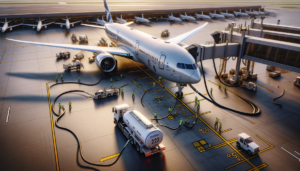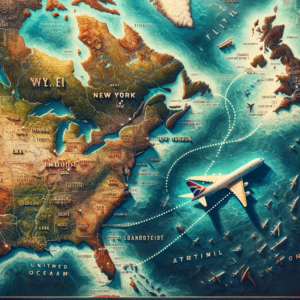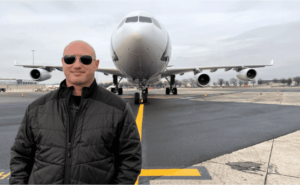The allure of soaring above the clouds with the utmost privacy and luxury is driving more travellers to opt for private jet travel on transatlantic flights. It’s a burgeoning trend that has steadily gained traction, offering an escape from bustling commercial airports and crowded airliners. The capacity to cross the Atlantic in a private jet not only exemplifies the pinnacle of luxury travel but also showcases significant advancements in aviation technology and safety in air travel.
Navigating across the vast expanse of the Atlantic Ocean requires careful consideration, particularly when selecting the appropriate type of aircraft. Light jets, favoured for their efficiency on shorter routes, generally don’t cut due to their limited range. Mid-sized jets offer greater endurance but may require refueling stops depending on specific private jet routes. Heavy jets are typically preferred for non-stop transatlantic journeys as they are equipped with advanced fuel systems and are designed following ETOPS regulations, ensuring both flight duration and safety measures meet high standards.
When considering a transatlantic journey by private jet, potential flyers weigh factors like flight cost against personalized convenience and reduced jet lag. The tailored scheduling helps mitigate exhaustion commonly associated with long-haul commercial flights, making it an attractive option for those who value time efficiency and comfort.
Factors to Consider
Range of the Private Jet
When contemplating transatlantic flights with a private jet, range stands as a pivotal factor. Various jet categories, from light jets to heavy jets, offer different ranges suitable for crossing the Atlantic. Light jets are generally ideal for shorter trips, while heavy and ultra-long-range jets can comfortably make the non-stop journey across the ocean. For example, a heavy jet like the Gulfstream G650ER boasts an impressive range of up to 7,500 nautical miles—more than enough for most transatlantic routes.
- Light Jets: approximately 2,000 to 2,500 nautical miles
- Mid-sized Jets: about 3,000 to 4,000 nautical miles
- Heavy Jets: can exceed 6,000 nautical miles
Selecting a jet with an appropriate range ensures that stops for refueling are minimized or entirely avoided which enhances comfort and reduces flight duration.
Fuel Capacity and Efficiency

Fuel capacity directly correlates with a private jet’s ability to complete long-haul flights without stopping. It’s essential that the aircraft carries enough fuel not only for the journey but also reserves in case of diversions due to unforeseen circumstances. The efficiency of fuel consumption is equally crucial as it affects both flight cost and potential environmental impact.
Jets designed specifically for long distances often feature advanced aerodynamics and engines optimized for fuel efficiency. This results in lower operational costs per mile when compared to older or less sophisticated models.
Weather Conditions
Impact of Wind and Weather on Flight Times
Weather conditions play a significant role in air travel safety and scheduling; this holds especially true for flights over vast bodies like the Atlantic Ocean where weather patterns can be unpredictable. Tailwinds may significantly decrease flight times while headwinds have the opposite effect causing delays and increased fuel consumption.
Pilots rely heavily on accurate weather forecasts before departure which allows them to calculate optimum flight paths; thus ensuring safety in air travel along with time and cost-efficiency:
- Favorable tailwinds can reduce transatlantic flight duration.
- Headwinds require more fuel leading potentially higher costs.
Monitoring weather trends is vital part of pre-flight planning processes among pilots operators alike within luxury travel industry.
Most Popular Private Jet Routes Across the Atlantic
From North America to Europe and Vice Versa
The most frequented routes by private jets between North America Europe provide glimpses into popular destinations demand within luxury travel sector. Flights from New York Teterboro Airport London Luton Airport rank highly sought-after with travelers seeking convenience speed associated private jet travel avoiding hassles commercial airlines typical security lines connections associated larger airports:
| Route | Approximate Distance (nautical miles) |
|---|---|
| New York (Teterboro) – London (Luton) | ~3,000 |
| Los Angeles (Van Nuys) – Paris (Le Bourget) | ~5,600 |
Flight Times for Different Routes
Flight durations will vary based on specific city pairs type aircraft chosen overall distance covered during journey:
- A mid-sized jet traveling from New York London might take roughly 6–7 hours depending conditions.
- Alternatively flying same route using heavy longer range aircraft could potentially shave off hour so from total travel time thanks enhanced speed capabilities these types vessels possess against their smaller counterparts.
Understanding expected flight durations assists travelers planning their schedules mitigating effects things like jet lag upon arrival final destination.
Ready experience unparalleled comfort privacy that comes hiring own private chartered airplane? At Centurion Jets we specialize providing top-tier service all your aviation needs whether you’re flying solo conducting business whole family vacation adventure tailored just you awaits! Contact us today let help craft perfect itinerary next transatlantic adventure aboard one luxurious fleet available market!

Long-Range Private Jets
When we talk about the prowess of private jets to span oceans and continents, it’s essential to spotlight long-range private jets. These aircraft redefine luxury travel, offering an unparalleled combination of comfort, speed, and range that make transatlantic flights not just possible but also exceptionally pleasant. Let’s dive into some of the most impressive models that have set the standard for international private jet travel.
Gulfstream G650
The Gulfstream G650 is a beacon of luxury in the sky. It stands as one of the fastest and longest-range business jets ever made.
- Range: Capable of flying up to 7,000 nautical miles non-stop
- Speed: Can reach a maximum operating speed of Mach 0.925
- Features: Boasts a spacious cabin with large windows and advanced soundproofing for ultimate comfort
This aircraft isn’t just about getting you from point A to B; it’s about doing so with an exceptional level of sophistication. The flight cost may be higher than smaller jets, but what you get is worth every penny:
- Elevated experience: With fine leather seats that recline into beds and gourmet meal capabilities
- Reduced jet lag: Thanks to lower cabin altitude levels which help minimize fatigue after long-haul flights
Safety in air travel is paramount with the G650 equipped with Enhanced Vision System (EVS) technology providing pilots better visibility—a crucial asset during challenging weather conditions or at unfamiliar airports.
Bombardier Global 7500
Another titan in the realm of long-range private jets is the Bombardier Global 7500.
| Feature | Specification |
|---|---|
| Range | Up to 7,700 nautical miles |
| Speed | Top speed of Mach 0.925 |
| Cabin Length | Largest in its class at over 54 feet |
This heavy jet has redefined expectations for flight duration by allowing passengers to fly nonstop between practically any two cities on Earth. Here’s how it elevates private jet routes:
- Unmatched comfort: Offers four true living spaces including a full kitchen and stateroom
- Pinnacle luxury: Furnished with amenities like stand-up showers and permanent beds
The Global 7500 also adheres strictly to ETOPS (Extended-range Twin-engine Operational Performance Standards) requirements ensuring high levels of safety over vast expanses like oceans where alternate landing options are sparse.
By utilizing these technological marvels light jets mid-sized jets seem more suited for shorter voyages while heavy hitters like the G650 and Global 7500 excel at connecting distant locales seamlessly.
Ready for your own transatlantic journey without hassles or connections? Choose Centurion Jets for your next high-end adventure across skies blue. Our fleet features only top-tier aircraft designed specifically for discerning travelers seeking privacy convenience and utmost safety during their airborne escapades whether it’s combating jet lag on overnight trips or simply indulging in opulence above clouds we’ve got all bases covered Contact us today let’s chart course towards your next destination together!
Factors Affecting Transatlantic Flights
Tailwinds and Headwinds
When we talk about transatlantic flights, one can’t ignore the impact of tailwinds and headwinds. These wind patterns play a crucial role in flight duration for private jet travel. Tailwinds, which blow in the same direction as the aircraft, can significantly reduce travel time. They give jets an extra push, allowing them to conserve fuel and increase speed. On the flip side, headwinds work against the aircraft, increasing fuel consumption and extending flight times.
- Tailwinds:
- Decrease fuel consumption
- Reduce flight duration
- Headwinds:
- Increase fuel needs
- Extend travel time
Statistics show that a strong tailwind can cut down a transatlantic journey by up to several hours—a boon for passengers eager to avoid jet lag.
Fuel Stops
Private jets vary greatly in range capabilities—light jets might require one or more stops to refuel when undertaking long journeys such as transatlantically while mid-sized or heavy jets are engineered for longer distances without needing to stop. Here’s how they stack up:
- Light Jets: Often need refueling stops.
- Mid-Sized Jets: Might complete the trip non-stop depending on specific model capabilities.
- Heavy Jets: Designed for long-haul routes like transatlantic flights with no stops required.
Fuel stops not only add to the overall flight cost but also extend the travel time and could potentially contribute to passenger fatigue. Operators often plan these stops at convenient locations where passengers can stretch their legs in luxurious surroundings.
Alternate Airports
Safety in air travel is paramount; hence private jet routes across the Atlantic must include planning for alternate airports. ETOPS (Extended-range Twin-engine Operational Performance Standards) regulations affect twin-engine planes more than those with multiple engines but all aircraft must have a strategy for unexpected diversions due to emergencies or adverse weather conditions.
Here are key considerations involving alternate airports:
- Proximity: Alternate airports should be within a reasonable distance from the planned route.
- Facilities: These airports need adequate facilities to handle unexpected landings.
Having options ensures peace of mind during luxury travel knowing safety measures are firmly in place.
Ready for unmatched luxury and efficiency on your next transoceanic journey? Consider Centurion Jets—where safety meets sophistication in private jet travel. From selecting optimal private jet routes dodging headwinds to choosing jets that suit your specific needs whether it’s light jets zipping across skies or heavy jets soaring hassle-free over vast oceans our team ensures you reach your destination with comfort and style minimizing jet lag while maximizing your experience!
Flight Planning for Transatlantic Flights
Route Selection
When preparing for transatlantic flights, the right route selection is crucial. Private jet travel offers flexibility far beyond commercial airlines, allowing us to tailor our flight path based on weather conditions, airspace restrictions, and points of interest. We typically consider three main types of jets: light jets, mid-sized jets, and heavy jets. The latter are often preferred for their longer range capabilities. Flight duration varies depending on the chosen aircraft and route; however, a private jet can cover the distance between New York and London in approximately 6-7 hours.
- Light Jets – Ideal for shorter transatlantic routes or stops along the way
- Mid-Sized Jets – Offer a balance between range and cost
- Heavy Jets – Provide maximum range and comfort for non-stop transatlantic travel
Choosing an optimal route also involves considering air traffic flows, which can affect both flight duration and cost.
Navigation and Communication
Navigating across the Atlantic demands advanced communication systems due to the lack of radar coverage over much of this vast oceanic expanse. Pilots rely on High Frequency (HF) radio to maintain contact with Air Traffic Control (ATC) while using satellite-based systems like GPS for precise navigation. Safety in air travel during these long-haul journeys is paramount; hence modern avionics play a vital role.
Private jet routes are planned meticulously with attention to waypoints that guide pilots along prescribed tracks known as ‘North Atlantic Tracks’ (NATs), which change daily based on weather conditions.
Documentation and Permissions
Immigration Process for Private Jet Flights
Before taking off on a luxury travel adventure across the Atlantic, it’s important we ensure all documentation is in order. This includes visas if required by our destination country. Unlike commercial flights where passenger processing is routine, private jet travelers often experience expedited immigration processes at smaller airports or dedicated FBOs (Fixed Base Operators).
We must obtain overflight permits when crossing different countries’ airspace and landing permits from each country we plan to visit or stopover in en route.
Avoiding Jet Lag on Long Haul Private Jet Trips
Jet lag can be an unwelcome companion during long-distance journeys such as transatlantic flights. We advise adjusting sleep schedules prior to departure when possible and staying hydrated throughout the flight to mitigate its effects. Luxury travel aboard private jets also allows passengers greater freedom to move around during the flight—an effective way to combat fatigue—and enjoy more personalized meal services that cater to individual circadian rhythms.
Overwater Operations and ETOPS Regulations
Extended-range Twin-engine Operational Performance Standards (ETOPS) regulations don’t apply directly to most private jets since they’re designed primarily for twin-engine airliners flying routes where there are significant distances from suitable emergency landing airports. However safety protocols akin to ETOPS are observed including plotting courses within certain distances from diversionary airports should an emergency arise during overwater operations.
Safety Measures: Survival Suits and Rafts
Onboard safety measures include equipping aircraft with survival suits rafts extra food water medical kits signaling devices These items ensure preparedness should we face an unexpected event while traversing remote regions of open water
Safety drills practice sessions form part of pre-flight preparations ensuring both crew passengers well versed in potential scenarios
Travelling with Pets
Travelling with Pets The joy of bringing furry friends aboard shouldn’t overshadow the necessary planning involved When traveling pets factors consider health certificates vaccinations crate specifications International pet transport regulations vary so it’s essential to verify the receiving country’s requirements well in advance
With proper preparation and pet-friendly amenities available aboard many private jets and compassionate crew members your beloved animals will enjoy comfortable secure journeys just like their human counterparts.
Why Hire Centurion Jets?
After diving deep into what it takes to plan a successful transatlantic journey why not let Centurion Jets take the hassle out equation? With extensive experience crafting seamless bespoke flying experiences team at Centurion Jets stands ready to elevate your next venture above the clouds Contact us today to learn more about hiring your very own private jet unparalleled service awaits!
Book a Long Range Private Jets to Fly Across the Atlantic
Booking a long-range private jet is key for anyone looking to experience the utmost in luxury travel while crossing the vast Atlantic Ocean. Our expertise in private jet travel assures you that transatlantic flights are not just possible but come with unparalleled comfort and efficiency.
Long-range jets, typically classified as heavy jets, are designed to handle these extensive distances with ease. They boast larger fuel capacities, luxurious cabins, and robust engines that meet ETOPS (Extended-range Twin-engine Operational Performance Standards) requirements, ensuring safety in air travel over long stretches of water.
Here’s what you can expect when booking a long-range jet:
- Flight Duration: Transatlantic journeys vary but can take anywhere from 6 to 12 hours depending on your specific route.
- Flight Cost: While prices fluctuate based on several factors including time of year and specific aircraft model, expect premium rates for these elite services.
- Types of Jets: A variety of heavy jets like Gulfstream G650ER or Bombardier Global 6000 offer the range needed for such trips. Mid-sized jets may suffice for shorter transatlantic routes; however, they often require refuelling stops.
To minimize jet lag consider booking overnight flights allowing you to sleep en route and arrive refreshed. Choose flight times that align with your natural sleep patterns when possible.
Flying privately significantly reduces time spent at airports providing an overall faster door-to-door journey. This convenience paired with onboard amenities ensures you arrive at your destination without the common stressors associated with commercial air travel.
Why Choose Long-Range Jets?
Choosing a long-range private jet offers numerous advantages:
- Non-stop travel across the Atlantic
- Spacious cabins suitable for work or relaxation
- Tailored catering and in-flight service
- Reduced impact of jet lag due to customizable scheduling
- Enhanced privacy is essential for high-profile travelers
Our clients consistently report satisfaction with their choice to book heavy jets for their transatlantic needs noting the perfect blend of luxury comfort and efficient travel times.
Looking to elevate your next transatlantic journey? At Centurion Jets we specialize in providing top-tier private jet options tailored specifically to your needs. Whether it’s avoiding the hassles of traditional airport experiences or simply savoring every moment of luxury travel we’re here to ensure your trip is as seamless as possible. Contact us today and let’s chart out your ideal private jet route across the Atlantic!



